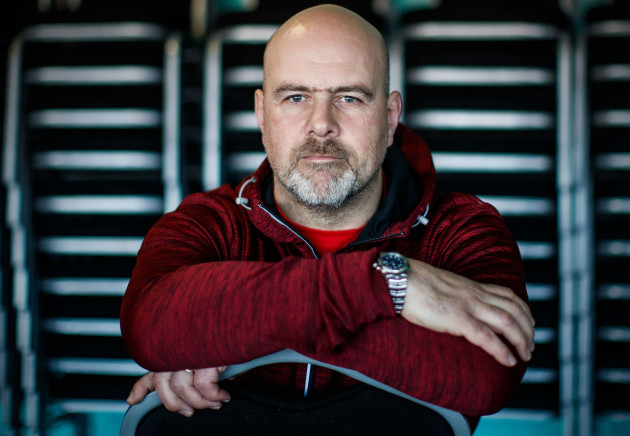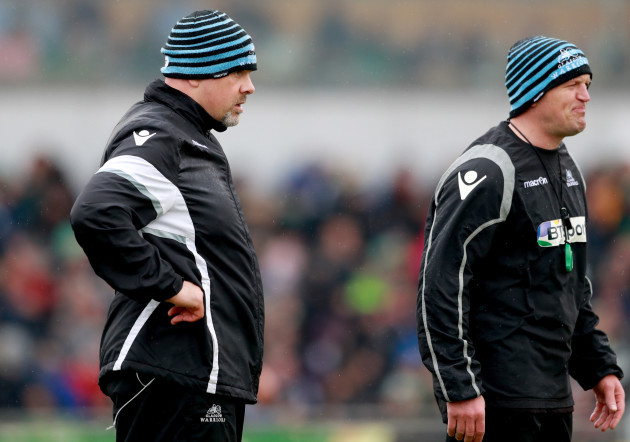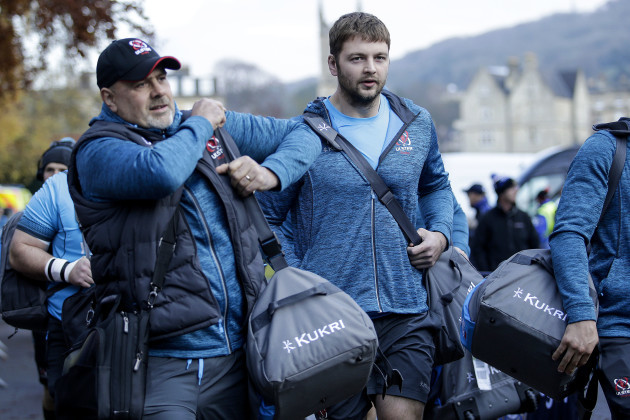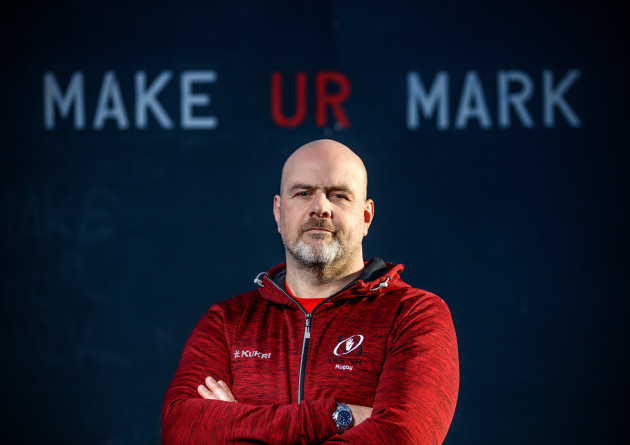IT ALL STARTED with picking up a book in a second-hand bookshop when he started assistant coaching with Connacht.
Dan McFarland recalls paging through the Introduction to Psychology tome, his interest very much piqued. He handed over the €3, went home and voraciously worked his way through the book.
Now boss of Ulster, McFarland’s deep interest in and study of psychology is a key component in his coaching make-up and it’s hard not to suggest that the results are increasingly evident in the northern province’s performances.
Ulster’s players seem more confident, more consistent, happier. They have won several big games by showing composure and grit in dramatic final minutes. McFarland’s side are certainly still a work in progress but his psychological slant appears to be rubbing off.
That second-hand book was the start of the journey for him, as he subsequently took on several courses in psychology, realising that this was his real educational interest, rather than the Classics degree he had struggled with in university many years before.
He and his wife Danielle were then deeply grateful when her mother offered to pay for McFarland to take on a psychology degree, which he thoroughly enjoyed.
The issue was that what he was learning wasn’t very practical in terms of applying it to rugby, and McFarland cites his move to Glasgow Warriors to work under Gregor Townsend as being an important spark in that sense, helping him to discover the ‘growth mindset’ that now drives Ulster.
“I was really interested in how psychology applied to learning in a rugby environment because I was originally training to be a teacher and gave that up to become a rugby player,” explains the 46-year-old, who is in his second season in charge of Ulster.
“As I was applying more of it, I got a phone call from Gregor and he came over to Dublin to talk about doing the Glasgow job and that totally opened my eyes. One of the first things we talked about was Mindset, Carol Dweck’s book, and I had never heard of it. I went away and read the book and I thought, ‘Jeez, this is a fella I would like to work with’.
“Gregor’s total focus on that for himself and just really the concept of saying, ‘I don’t actually know a lot and there are a lot of people out there who know a lot, they can teach me’ was something brand new and I don’t know if it was arrogance on my part or just that you don’t know what you don’t know.
“Going to Glasgow, working with Matt Taylor, Kenny Murray, Gav Vaughan, those guys had a really open mind and we would come in on a review morning and a chunk of the time might not even be talking about our game, it might be talking about a four-man lineout from the Highlanders!
“We always had people coming in from outside too, which I really liked. Rugby, for me, had always been a bit of secret squirrel but I found out that unless you show people what you’re doing, they’re never going to show you what they’re doing.
“If you back what you’re doing and believe you can learn from other people, it’s only going to get what you’re doing better, then it’s up to them to try and keep up. I love that, it puts pressure on you to keep getting better.”
McFarland continued to work with Townsend with Scotland before Ulster and the IRFU came calling last year and bought him out of his contract in order to install him as the Irish province’s head coach.
So far, the results have been highly encouraging and Ulster’s four wins from four in the Heineken Champions Cup this season leave them nicely poised to secure their second European knock-out game in two campaigns under McFarland.
The growth mindset – essentially, operating with the viewpoint that ability in any skill or task does not have a limit and can be improved – is a massive part of the Ulster set-up.
McFarland has firmly instilled a ‘fight for every inch’ mentality in his players, but he has also driven what they call a ‘squeeze every drop’ mindset within the entire organisation.
“That ‘every inch’ mentality was the most important, the competitive side,” he explains. “But there’s also an undercurrent that, for me, is going to be really important to everything I do anywhere I go and always has been – and that’s a development philosophy, a learning and a growth philosophy.
“‘Squeeze every drop’ is a moniker we put on top of that.
“Why is important in Ulster? It’s important because the squad was so young and it was very important that if you wanted sustainability and success, there had to be development in the pathways and within the squad.
“In order to get to the level we want to, it’s not possible to go out and buy that kind of squad – that’s reserved for other teams.
“Logically, you’ve got to be able to get there in a different way and putting a premium on development and squeezing every drop out of everybody’s potential. We have individual responsibility for squeezing every drop and that includes staff as well as the players.
“It’s equally important. Not upskilling your influencers would be a ridiculous scenario, and that goes for me. I have a personal development plan, the guys all work on their personal development plans in the support staff. We give guys the opportunity, whether it’s bringing in Karen Brown and Jo Hopkins to talk about leadership for all the staff, or whether it’s us going out to visit Belfast Giants [ice hockey team] or them coming to us, or it could be getting the Ireland coaches to come in so we can share.
“All of those things are vitally important. We have guys go out to do CPD, they’ll come back and share and we’ll talk about that. Anything that we can learn is the bottom line. It’s very easy to be insular and think you know everything but the best knowledge comes from the outside, the stuff you haven’t thought of.”
The visit from leadership specialists Karen Brown and Jo Hopkins was a particularly pertinent one, with Ulster undergoing major changes to their leadership structure this season after the retirement of Rory Best.
Iain Henderson is the new Ulster captain but McFarland explains that the absence of Best has seen several other figures step up in terms of leadership too.
“Besty not being there has certainly changed the leadership dynamic massively,” says McFarland. “Because he’s such a big personality and had such an influential and very, very positive position as a leader in Ulster, it didn’t need as many people around him to pick up slack because he was so smart and so good at it.
“When he’s not there, people have to and it naturally occurs. Leaders are emergent in that vacuum because they want Ulster to be successful. We have a very strong leadership group now.
“When you insert people – and I say people, not players – of the quality of Sam Carter and Jack McGrath into that environment, it has a big effect on the people around them. Luke Marshall has stepped up this year, Rob Herring, and obviously Hendy who has led the team really well.
“It’s part of my job to help them find voice and to distribute the leadership so it’s not just everybody listening to me, the other coaches, or Hendy.”
Alongside the developments Ulster are making mentally and in terms of their leadership, their tactical and technical quality appears to be improving month-on-month.
McFarland has had many influences on his thinking around how the game should be played, right from the set-piece focus at Galwegians and under John Kingston in Richmond during his playing days.
He looks back on Pat Lam’s persistence with the 2-4-2 system at Connacht, despite those around him being dubious for some time, as educational before also learning from Townsend’s high-tempo approach with Glasgow and Scotland.
McFarland is now the boss and one key principle provides the foundation for everything.
“If I was to describe the way we want to play it’s ‘collective speed.’ I like that because it builds in the idea of tempo but also the idea that it has to be done together.
“If you watch our defensive system over the last 18 months, I would definitively say there has been huge progress. It’s the collective side of how the team works together and the speed at which they work that has been the biggest, most notable thing for me.
“Some people might say the physicality has come on or you’re not making as many errors in defence, but I would say that’s all due to the energy that the guys put in, in addition to the organisation that Jared [Payne, defence coach] has put in place. If we don’t have that collective speed in defence, then you don’t get the results of the big hits you see at the weekend.
“Attack-wise, I love the system that we play. Dwayne [Peel, attack coach] has a really strong philosophy on the way that he wants to play the game. That’s evident in the way we play. The thing we need to improve, somewhere a team like Leinster is so far ahead of us, is their ability to be precise and to be consistently precise.
“That’s not a quick fix, that’s a long-term development process through the way that you train. I don’t ever want to become a team that fears risk and doesn’t want to play near the edge because if you don’t play near the edge, you don’t find out your limits, so we’re going to have trouble with that.
“I believe we’re going to have trouble with that for a while, but we just have to keep focusing on our standards.”




